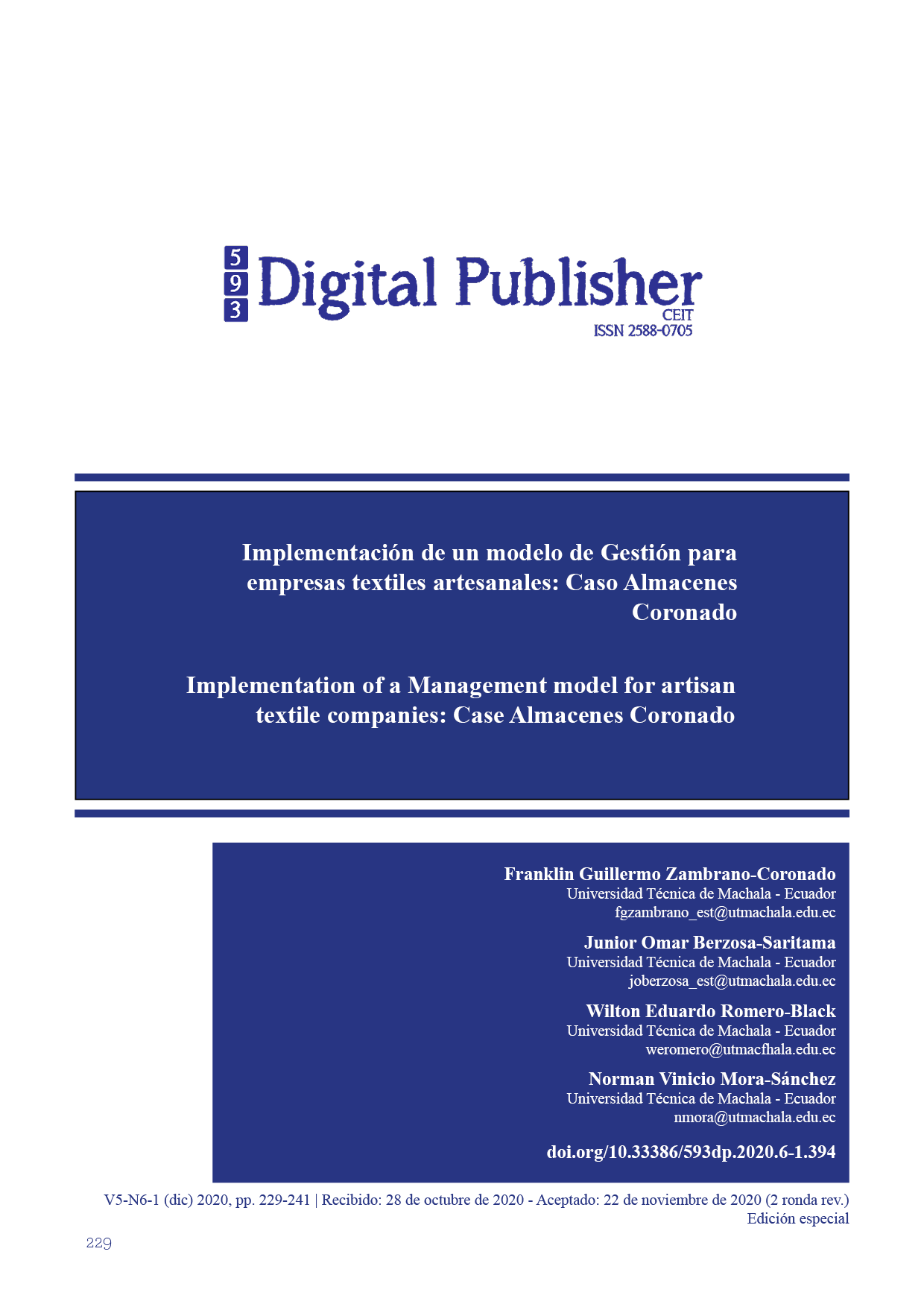Implementation of a Management model for artisan textile companies: Case Almacenes Coronado
Main Article Content
Abstract
This scientific argument defines the proposal for the implementation of a management model for artisan textile companies, taking the case of Almacenes Coronado in the city of Machala; based on the organizational conjunction of offering a product and service that satisfies or generates a need efficiently. Consequently, the implementation of a well-structured, documented management model with a qualitative - quantitative approach which integrates technical and managerial procedures will guarantee impact on the final quality of the product offered by the company; and through the high-level management that is provided through the mechanization and standardization of quality standards in the company, it can achieve greater competitiveness, productivity and sustainability compared to the competition. Decision-making based on the goals and objectives of the organization, risk-based reasoning and the most relevant one such as continuous improvement, are the bases to homogeneously structure a management model. This research work focuses on studying the quality of the product and its value chain or added value that the company offers; and thus, standardize its processes which allows detecting shortcomings and through continuous improvement allows to fully capture the expectations that the client has on product quality.
Downloads
Article Details

This work is licensed under a Creative Commons Attribution-NonCommercial-ShareAlike 4.0 International License.
1. Derechos de autor
Las obras que se publican en 593 Digital Publisher CEIT están sujetas a los siguientes términos:
1.1. 593 Digital Publisher CEIT, conserva los derechos patrimoniales (copyright) de las obras publicadas, favorece y permite la reutilización de las mismas bajo la licencia Licencia Creative Commons 4.0 de Reconocimiento-NoComercial-CompartirIgual 4.0, por lo cual se pueden copiar, usar, difundir, transmitir y exponer públicamente, siempre que:
1.1.a. Se cite la autoría y fuente original de su publicación (revista, editorial, URL).
1.1.b. No se usen para fines comerciales u onerosos.
1.1.c. Se mencione la existencia y especificaciones de esta licencia de uso.
References
Arguello Mendoza, C. P. (2017). Desarrollo de un modelo de gestión del conocimiento para las PYMES del sector textil de la ciudad de Riobamba. Industrial Data, 20(2), 79-86.
Carralero-Hidalgo, L., Tamayo-Fajardo, M. A., Vilariño-Corella, C., & Ruiz -Almeida, D. (octubre-diciembre de 2015). La innovación en la competitividad a partir de la relación universidad– empresa. Ciencias Holguín, XXI(4), 1-11. Obtenido de https://www.redalyc.org/articulo.oa?id=181542152005
de Ocampo, R., Stella, L., Estrada, S., & Ramírez, C. (12 de 2007). Modelo de gestión de indicadores para una empresa de venta de vehículos. XIII(37), 383-388. Recuperado el 07 de 10 de 2020, de http://www.redalyc.org/articulo.oa?id=84903766
Díaz-Narváez, V. P., & Calzadilla Núñez, A. (2016). Artículos científicos, tipos de investigación y productividad científica en las Ciencias de la Salud. Revista Ciencias de la Salud, 14(1), 115-121. Obtenido de http://www.redalyc.org/articulo.oa?id=56243931011
Duque, D. (2017). Modelo teórico para un sistema integrado de gestión (seguridad, calidad y ambiente). V(18), 3. Recuperado el 09 de 09 de 2020, de https://www.redalyc.org/articulo.oa?id=215052403009
Fernandez, J. (2014). Optimización de la cadena logística. En J. Fernandez, & E. C. S.L. (Ed.), Optimización de la cadena logística. Madrid, España. Recuperado el 07 de 10 de 2020, de https://books.google.com.ec/books?id=mOpCDwAAQBAJ&printsec=frontcover&hl=es&source=gbs_ge_summary_r&cad=0#v=onepage&q&f=false
Gabriela, A. L., Bill, S. O., & Guido, S. P. (enero-marzo de 2017). EL LIDERAZGO DE LOS GERENTES DE LAS PYMES DE MACHALA. Universidad y Sociedad, 9(1). Recuperado el 08 de 2020, de http://scielo.sld.cu/scielo.php?script=sci_arttext&pid=S2218-36202017000100027
Gardetti, M. (2017). Textiles y Moda: ¿Qué es ser sustentable? En M. Á. Gardetti, Textiles y Moda: ¿Qué es ser sustentable? (pág. 256). LID. Recuperado el 10 de 15 de 2020, de https://books.google.com.ec/books?id=99InDwAAQBAJ&printsec=frontcover&hl=es&source=gbs_ge_summary_r&cad=0#v=onepage&q&f=false
González, J., & Rodriguez, M. (2018). Gestión del conocimiento, capital intelectual e indicadores aplicados. En Gestión del conocimiento, capital intelectual e indicadores aplicados (pág. 138). Ediciones Díaz de Santos. Recuperado el 10 de 07 de 2020, de https://books.google.com.ec/books?id=oB9zDwAAQBAJ&printsec=frontcover&hl=es&source=gbs_ge_summary_r&cad=0#v=onepage&q&f=false
ISO. (15 de 9 de 2015). ISO 9001:2015 Sistemas de gestión de la calidad. Recuperado el 10 de 07 de 2020, de www.iso.org: https://www.iso.org/standard/62085.html
LAFAYETTE S.A., T. (10 de 2015). LAFAYETTE. Recuperado el 25 de 09 de 2020, de LAFAYETTE: https://www.lafayette.com/calidad/
Larios Francia, R. P. (enero-diciembre de 2017). Estado actual de las mipymes del sector textil de la confección en Lima. Ingeniería Industrial(35), 113-137. Recuperado el 12 de 08 de 2020, de http://www.redalyc.org/articulo.oa?id=337453922006
Liker, J. K. (2019). Las claves del éxito de Toyota: 14 principios de gestión del fabricante más grande del mundo. En J. Liker, Las claves del éxito de Toyota: 14 principios de gestión del fabricante más grande del mundo. Grupo Planeta. Recuperado el 23 de 10 de 2020, de https://books.google.com.ec/books?id=2tiuDwAAQBAJ&printsec=frontcover&hl=es&source=gbs_ge_summary_r&cad=0#v=onepage&q&f=false
Lugo-Morin, D. R., Ramírez-Juárez, J., Navarro-Garza, H., & Estrella-Chulim, N. G. ( septiembre-diciembre de 2018). Etnocompetitividad del sistema artesanal textil Mitla, el papel del territorio y la innovación. Economía, Sociedad y Territorio, VIII(28), 981-1006. Recuperado el 13 de 08 de 2020, de http://www.redalyc.org/articulo.oa?id=11102807
Luque González, A. (2018). Elementos que favorecen la producción textil transnacional y relación con su responsabilidad social empresarial. Cuadernos Latinoamericanos de Administración, XIV(26), 1-22. Recuperado el 15 de 10 de 2020, de https://www.redalyc.org/jatsRepo/4096/409656163005/index.html
Luque González, A. (2018). ELEMENTOS QUE FAVORECEN LA PRODUCCIÓN TEXTIL TRANSNACIONAL Y RELACIÓN CON SU RESPONSABILIDAD SOCIAL EMPRESARIAL. Cuadernos Latinoamericanos de Administración, XV(26), 1-24. Obtenido de http://www.redalyc.org/articulo.oa?id=409656163005
Luque González, A., Hernández Zubizarreta, J., & De Pablos Heredero, C. (2016). Fortalezas dentro de los procesos de mundialización textil y relación con la rse a través de un analisis delphi: ética o estética. Revista Galega de Economía, 25(1), 5-32. Recuperado el 12 de 08 de 2020, de http://www.redalyc.org/articulo.oa?id=39146518001
Nájera Ochoa, J. (enero-junio de 2015). Modelo de competitividad para la industria textil del vestido en México. Universidad & Empresa, 17(28), 37-68. Obtenido de https://www.redalyc.org/jatsRepo/1872/187243060003/index.html
Pérez Seoane, J. (noviembre de 2020). ESTRATEGIAS DE COMUNICACIÓN TEXTIL EN LA EURORREXIÓN GALICIA-NORTE DE PORTUGAL. Razón y Palabra(74), 1-13. Recuperado el 15 de 10 de 2020, de http://www.redalyc.org/articulo.oa?id=199516111007
Pérez Vera, M. G., Ocampo Botello, F., & Sánchez Pérez, K. R. (julio-diciembre, de 2015). Aplicación de la metodología de la investigación para identificar las emociones. RIDE Revista Iberoamericana para la Investigación y el Desarrollo Educativo, 6(11), 1-27. Obtenido de http://www.redalyc.org/articulo.oa?id=498150319048
Ribeiro, A. A. (2015). UN MODELO DE GESTIÓN QUE GARANTIZA LA SUPERVIVENCIA DE LAS ORGANIZACIONES. Revista Científica "Visión de Futuro", 3(1), 1-11.
Sánchez, S. (2017). Gestión de la calidad ISO 9001/2015 en comercio. En S. Sánchez Azor, Gestión de la calidad ISO 9001/2015 en comercio (pág. 342). España: ELEARNING. Recuperado el 10 de 23 de 2020, de https://books.google.com.ec/books?id=izZWDwAAQBAJ&printsec=frontcover&hl=es&source=gbs_ge_summary_r&cad=0#v=onepage&q&f=false
Socconini, L. (2020). Lean Six Sigma Green Belt. Manual de certificación. En L. Socconini, & M. BOOKS (Ed.), Lean Six Sigma Green Belt. Manual de certificación (pág. 354). Barcelona, España. Recuperado el 16 de 10 de 2020, de https://books.google.com.ec/books?id=adD8DwAAQBAJ&printsec=frontcover&hl=es&source=gbs_ge_summary_r&cad=0#v=onepage&q&f=false
Vargas-Hernández, J. G., Muratalla-Bautista, G., & Jiménez-Castillo, M. (2016). Lean M anufacturing ¿una herramienta de mejora de un sistema de producción? Ingeniería Industrial, V(17), 153-174.
Zabaleta de Armas, M. I., Brito Carrillo, L. E., & Garzón Castrillón, M. A. (2016). Modelo de gestión del conocimiento en el área de TIC para una universidad del caribe. Revista Lasallista de Investigación, 13(2), 136-150. Recuperado el 07 de 2020, de http://www.redalyc.org/articulo.oa?id=69549127014
Zabaleta de Armas, M. I., Brito Carrillo, L. E., & Garzón Castrillón, M. A. (2016). Modelo de gestión del conocimiento en el área de TIC para una universidad del caribe colombiano. Revista Lasallista de Investigación, 13(3), 126-150. Recuperado el 12 de 08 de 2020, de http://www.redalyc.org/articulo.oa?id=69549127014
Zambrano, E., Prieto, A. T., & Castillo, R. (septiembre-diciembre, de 2015). Indicadores de gestión de mantenimiento en las instituciones públicas de educación superior del municipio Cabimas. Telos, 17(3), 495-511. Recuperado el 13 de 10 de 2020, de https://www.redalyc.org/articulo.oa?id=99342682008





